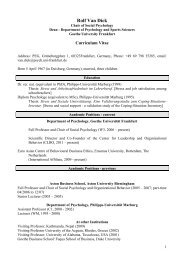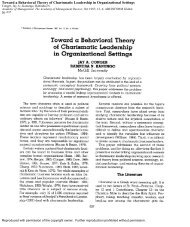Leadership-Interview-Transkript - Sozialpsychologie - Goethe ...
Leadership-Interview-Transkript - Sozialpsychologie - Goethe ...
Leadership-Interview-Transkript - Sozialpsychologie - Goethe ...
Erfolgreiche ePaper selbst erstellen
Machen Sie aus Ihren PDF Publikationen ein blätterbares Flipbook mit unserer einzigartigen Google optimierten e-Paper Software.
Michael A. West<br />
Short biography<br />
Professor West was born in Wales and has worked in the Welsh coal mines. He studied at the<br />
Universities of Swansea and Cardiff, became Professor at Sheffield University and moved to<br />
Aston University, Birmingham, in 1998. Michael West served as the dean of Aston Business<br />
School for the last six years and in 2011 moved to Lancaster University. Professor West is<br />
elected Fellow of almost every important society in his field including the American<br />
Psychological Association, the British Academy and the Royal Society for the<br />
Encouragement of Arts, Manufactures and Commerce, to name but a few. He has published<br />
numerous books, hundreds of academic papers and chapters.<br />
<strong>Interview</strong> conducted in Frankfurt am Main on June 24 th , 2011<br />
Rolf van Dick: Today we are talking to Michael West Professor at Lancaster School of<br />
Management and Lancaster University. Thank you very much Michael for taking the time.<br />
You have got your degrees from the welsh universities where you are from. Universities like<br />
Swansea and Cardiff. Actually at Cardiff University you did your PhD. Very interesting is<br />
also that you worked in the welsh Coalmines while being in the PhD Program. You became a<br />
professor for Psychology at Sheffield University, then you moved to Aston Business-School<br />
in 1998, then we met each other and worked together at Aston University. For the last six or<br />
seven years you were Dean of Aston Business-School, and finally you moved to Lancaster<br />
University. You have published numerous books on teamwork, cooperation, innovation and<br />
creativity you published hundreds of articles and book chapters. You are fellow of almost<br />
every association or society in our Area. And then, and that’s probably the most important<br />
achievement, you have impact in the real World, with your studies on health service in Great<br />
Britain. You are consulting secretaries of health or Downing Street and others officials.<br />
Today we are not so interested in you scientifically, academic insights in leadership research<br />
but your personal experiences. The first question is quite simple: Do you think leadership is<br />
important? Do we need it, or can people be like you as an example self organized and self<br />
motivated?<br />
Michael West: My sense is that we do need to have <strong>Leadership</strong>, but I think your conception<br />
of it should be a little more sophisticated. If you go back to the time where were out on the<br />
Savanna 150.000 years ago and to survive you need o catch an Antelope in order you can feed<br />
your group of people. And to catch an Antelope on the Savanna is a very complicated<br />
exercise. It requires that you know which animal you are going to pursue who is going to play<br />
what roles, and if you lose the animal in mid hunt you need to shift your focus of attention.<br />
And that requires leadership. So moreover you know somebody who will coordinate,<br />
somebody who enable people to communicate, somebody who will get people to terrify their<br />
roles. So I think it is inevitable that we look for leadership in situations which are complex or<br />
challenging. In my opinion this is very true in modern life and I think in many ways it is<br />
becoming more true than ever. But where we make a mistake is when we think that leadership<br />
is somehow a heroic figure it is somebody who is charismatic who is different from the rest of<br />
the crowd. Actually in a way we need everybody in Organizations and everybody in society to<br />
take responsibility for leadership. We all need to be leaders at particular points in time. I<br />
might give you an example, you know it from the working social psychology around by<br />
standing intervention, what we have there is people see an incident and because there are lots<br />
of other people around nobody takes action or responsibility. So I think there is something for
















